|
The Fate of Wildlife Globally Depends on Asia’s Response to Wildlife Crime By Steven Galster, Founder of Freeland Recent headlines remind us that our global biodiversity is at a tipping point. Two upcoming events present powerful opportunities to tip us in the right direction. Horrific seizures of wildlife parts, like the 30 tons of shark fin confiscated last month in Brazil en-route to Asia; and positive news this week of rising tiger populations in India and Bhutan, all beg the question -- which direction are we going in? Ecological collapse, or recovery? We continue to experience the fastest rate of species loss in history, accelerated by the multi-billion dollar commercial trade in wild animals and plants. A significant portion of that trade is driven by demand and a lack of adequate wildlife enforcement in Asia, and more specifically, in Southeast Asia and China. Which means that region’s response to wildlife crime may determine the fate of many species worldwide. Upcoming general assemblies of Southeast Asia’s lawmakers (ASEAN Inter-Parliamentary Assembly, or AIPA)) and law enforcers (ASEANAPOL)— both of which include consultations with their Chinese counterparts—, present excellent opportunities for this region’s leaders to examine their pivotal role in the protection of global biodiversity. (Before going on, let’s not forget: the United States and the European Union are two of the top importers of wildlife in the world. While much of their recorded trade is legal, we don’t really know how much of that legal trade is masking illegal trade. Nonetheless, the data indicates far more illegal wildlife trade is destined for buyers in Southeast Asia and China than anywhere else.) So, what is being done in Southeast Asia and China about this global crisis, and what is missing that AIPA, ASEANAPOL and other stakeholders should consider? Actually, plenty is being done, and to be fair, progress has been made throughout Southeast Asia and China, collectively known by conservationists as the global hotspot for wildlife crime. I’m a witness. Over the past 20+ years, our team and other groups have clocked in thousands of hours to improve Asian wildlife enforcement, and to reduce commercial demand for wildlife there. We’ve trained over 4,000 rangers and cops across the region to stop poaching and trafficking; helped NGOs and students campaign for legal reform and behavior change; and appealed to Asia-based corporations and development agencies to consider the impact on wildlife from their business plans. These efforts are starting to pay off: critically endangered tigers are slowly reappearing in Asian forests. Poaching of Asian elephants is down. Shark fin soup has disappeared from many Asian menus. And there’s more for conservationists to write home about. But something is missing. For example, we are still seeing multi-ton shipments of pangolins (the most heavily trafficked mammal in the world) being smuggled into Southeast Asia from Africa. In fact, we’re seeing all kinds of endangered and rare critters from Asia, Africa, Latin America and North America showing up for sale on Asian websites and in markets across parts of Southeast Asia and China. We’ve slowed the decline of wildlife species, but we have not stopped it. As a conservationist who has been trying to help unplug the Asian wildlife vacuum for 32 years, I’ve often asked: what more can we possibly do? The answer, I believe, is two-fold: (1) Fess up that we conservationists are not equipped to win this battle alone. We need help from other sectors, especially lawmakers and law enforcers. And (2) Flip our strategy. The current one is not working fast enough. What do I mean? First, the flip. Conservationists to date have understandably focused on reducing commercial demand for wildlife and strengthening punishment of wildlife crooks. After all, the trade is fueled by consumption, and enabled by weak laws and enforcement. Those efforts should continue, but it’s not where we should be spending the bulk of our efforts. We often hear conservationists cry, “we need more time and money.” And we do. It sometimes feels like we’re trying to cure cancer with modest 2-to-5 year grants. But the truth is, we don’t have time. We have to change things up now, lest we kiss many species goodbye. So, here’s the strategic flip: 1. Instead of focusing all energy on punishing crooks, let’s reward enforcers too. Laws and policies can be introduced that incentivize police and anti-money laundering agencies to seize the huge profits made by wildlife traffickers, and channel a piece of those assets into rewarding enforcers, and financing wildlife recovery in partnership with civil society. Make traffickers clean up the mess they created, while disabling them from striking again. 2. Instead of focusing so much time and money on changing bad behavior of current wildlife consumers, let’s foster good behavior of potential consumers. Demand reduction campaigns have aimed mostly at adults who recognize when they’re being manipulated. They may not be consuming as openly as before, but many are still secretly buying wildlife. Focus instead on kids who have yet to form entrenched habits, and who are better suited than anyone to influence their elders. 3. Instead of trying to reduce demand for wildlife among an audience that isn’t listening, let’s increase demand for wildlife protection among audiences whose help we desperately need. Conservationists often communicate and operate in an echo chamber, failing to reach outside their silos to effectively influence key players: consumers, government leaders, corporate executives, law makers and enforcers, and youth. This wider audience may express support for wildlife protection, but in reality they have other priorities: economy, health, national security, family, and children. Interest in fighting climate change and corruption is increasing. If we are going to turn things around for wildlife, we have to place wildlife protection into this core zone of Asian priorities. The good news is that we can do that. Wildlife protection does safeguard economies, and it does enhance public health by reducing the risk of disastrous zoonotic outbreaks, like COVID-19. It can support public and national security: wildlife trafficking rings are linked to other forms of organized crime. Wildlife protection mitigates climate change through improved biodiversity and ecosystem services. It can also illuminate and reduce corruption because that’s exactly what enables poaching and trafficking. And wildlife education can support families and children. Youth in Asia are no different from kids anywhere: exposed through effective storytelling, they’re drawn to animals and characters that hook their interest while teaching them topics they otherwise resist. The themes of AIPA’s and ASEANAPOL’s upcoming general assemblies are “stability and prosperity” and “safety for all”. Their members should consider how wildlife protection supports these goals. One final flip: As obvious as it sounds, we need to go local. Wildlife protection in Asia –and in many corners of the globe-- is still dominated by international conservation groups and international agencies that fund them. Significant support for Asia’s counter-wildlife efforts still comes from US and European donors that feel more comfortable channeling funds through US and European-led teams that understand their rules. Although these teams consist of local personnel, they’re rarely led by them. Asian governments should start ramping up their own financing of wildlife protection efforts. If we can link wildlife protection to Asia’s current priorities, with Asian stakeholders --not foreign conservationists--, leading the way, then Asia’s governments, enforcement, civil society, youth movements, and families will join, strengthen and sustain Asia’s conservation movement. The needle of progress will keep moving too slowly for wildlife if we keep pushing boulders up a hill. The inflection point for positive change will come when we cultivate a broad and lasting local appetite for wildlife protection. If we do that in Southeast Asia and China, we can transform that region from a wildlife crime hotspot into a global wildlife protection model, and start reversing the decline of species worldwide. Freeland is teaming up with AIPA, ASEANAPOL, and frontline civil society groups across Asia to increase youth outreach, reward protection, and build a broad base of support for nature conservation. We will soon announce more on this effort, and how you can join, in our next issue about “EarthTeam”.
1 Comment
Who knew that America's heartland, including Wisconsin and other states in the midwest, was playing such a significant role in the global wildlife business? Wisconsin is one of the 5 states in the country that allows private ownership of exotic animals as pets, like tigers, lions, and more. Wildlife zoos have sprouted up, and exotic pet fairs are booming. Where do these animals all come from? And what happens when owners get bored or move. Global trafficking of wild animals is moving through our state, including body parts of rhinos from Africa, and live monkeys from Asia's jungles.
On August 11th, experts in wildlife trade, protection, and rescue care, who are from Wisconsin, will join a recently retired federal special agent to reveal more interesting facts about the "wild midwest", and discuss what local communities might want to consider for themselves and the animals. Please come join us for this fascinating panel conversation hosted at the Green Lake American Legion. Speakers Include: · Steven Galster, Founder of Freeland, a Green Lake, WI-based NGO that counters wildlife and human trafficking globally. https://stevenrgalster.com/ · Edward Newcomer, former US Fish and Wildlife Service Special Agent, formerly based in LA, Africa and Asia. https://www.animallawconference.org/ed-newcomer/ · Amy Kerwin from Primates, Inc, which cares for abandoned primates in Wisconsin https://primatesinc.com/ · Jill Carnegie (VOTK Sanctuary), which rescues and cares for abandoned lions and other exotics, in Wisconsin https://votk.org/about-us/ * Carole Baskin, Founder of Big Cat Rescue, featured in the TV series, "Tiger King" (joining us virtually) This event is free and open to the public. Doors open at the legion at 5pm, we will offer free appetizers, cash bar, and then the informal, interactive discussion will start at 5:30pm, wrapping up by 6:30pm. This event will also be streamed on Freeland Facebook live. https://www.facebook.com/freelandglobal/ (Denpasar, 4th September 2022) – In response to ongoing criminal exploitation of Indonesia’s marine wildlife, this week agencies from across the country convened for a specialized joint training by Freeland to find and dismantle the organized criminal rings behind the poaching and trafficking that is causing serious harm to many species, like sea turtles, sharks, as well as critically important ecosystems.
Last year, over 11,000 recorded cases of illegal wildlife trade were pursued by Indonesian law enforcers. Data on this illicit trade suggests that organized criminal networks are behind it, and that the trade and the networks are transnational, with links to other countries in Asia and nearly every other continent. Conservation and law enforcement agencies are sounding the alarm bell that this illegal trade, if left unaddressed, will cause irreparable damage to Indonesia’s marine and terrestrial ecosystems, on which millions of people depend. In response, Indonesia’s National Police Security Maintenance Agency (Baharkam) in collaboration with the Directorate General of Marine and Fishery Resources Supervision (PSDKP-KKP) and WWF Indonesia Foundation, requested and helped organize the specialist “C-TOC” (Counter Transnational Organized Crime) training course, developed by the international counter-trafficking organization - Freeland. Delivered by Freeland, C-TOC helps law enforcers illuminate and dismantle underground criminal networks that are currently making billions of US dollars in profits around the world from the illegal exploitation of wildlife. C-TOC focuses on trafficking networks as commercial supply chains. Highlighting the challenge during the opening of C-TOC in Bali on August 29, Head of Security Maintenance Agency, Headquarter of Indonesia National Police, Commissioner General (Komjen) Pol. Drs. Arief Sulistyanto, M.Si said “This exploitation is carried out on a massive, illegal, and organized basis to be trafficked across countries – this is an extraordinary crime. Of course, great skills, knowledge, commitment, and cooperation is needed to be able to enforce the rule of law for this nature conservation effort.” He added, “We must be courageous enough to say no to various forms of violations and irregularities, because crimes in this field are economically very profitable. Do not allow us, who are given the power to fight crime, be controlled by criminals. We must uphold the rule of law to preserve nature and not let crime be more sovereign than the law itself.” Dr. Imam Musthofa, as the Head of the Marine and Fisheries Program of WWF Indonesia said, "The high biodiversity that Indonesia faces threats, one of them rampant illegal marine protected species trade. This activity is our effort to support the Indonesian government to increase the capacity of the frontline guards to deal with illegal trade." C-TOC is designed to help participating agencies form task forces at the national and regional level to jointly destroy the criminal networks. This week’s training brought together personnel from Indonesian police, customs, financial intelligence units, tax inspectors, anti-corruption, prosecutors, judges, fisheries, and more. The course uses a realistic mock syndicate, while imparting skills on open source intelligence, digital forensics, handling confidential informants, and more. In anticipation of increased interdictions of wildlife, C-TOC courses are followed by another course, “Care for Confiscated Wildlife” that trains participants how to handle confiscated wild animals. Led by partner, IFAW, with support from WWF, the Care for Confiscated Wildlife course is being delivered to some of the same Indonesian agencies this coming week in Bali. C-TOC and Care for Confiscated Wildlife are part of a trilateral country project called “TRIPOD” (Targeting Regional Investigations for Policing Opportunities and Development) which is sponsored by the Bureau of International Narcotics and Law Enforcement Affairs, through US Embassy Jakarta-Indonesia. This project aims to curb trafficking of wildlife through marine pathways between Indonesia, Malaysia and the Philippines, through capacity building and networking support. C-TOC was delivered in Malaysia in June, and will be conducted in Philippines in early 2023. “Wildlife traffickers are unfortunately still on the winning side of this battle over nature’s future,” said Steven Galster, Founder of Freeland. “But C-TOC can put enforcers on the winning side by helping them identify the criminals behind the killing and trafficking, arrest and prosecute them, while finding and seizing their massive ill-gotten wealth. C-TOC leads to the formation of interagency and multi-national task forces, and with political will, can make government agencies more powerful than the criminal networks that are destroying our earth.” Freeland is a frontline counter-trafficking organization staffed by law enforcement, development and communications specialists in Asia, Africa and the Americas who build capacity, raise awareness, and promote good governance to protect vulnerable people, wildlife, and ecosystems from trafficking, corruption, and neglect. www.freeland.org The International Fund for Animal Welfare (IFAW) is a global non-profit helping animals and people thrive together. We are experts and everyday people, working across seas, oceans and in more than 40 countries around the world. We rescue, rehabilitate and release animals, and we restore and protect their natural habitats. The problems we’re up against are urgent and complicated. To solve them, we match fresh thinking with bold action. See how at ifaw.org WWF-Indonesia is part of the international conservation organization WWF that is working to sustain the natural world for the benefit of people and wildlife.. https://www.wwf.id/ For more information: ●Siti Yasmina Enita, Marine and Fisheries Communication Specialist | 0813-2773-2944 | [email protected] ●Karina Lestiarsi, Communication, Campaign & PR Team WWF-Indonesia | 0852-181-616-83 | [email protected] ●Freeland | [email protected] Mother Earth Speaks! Let's listen. Featuring Jane Seymour, this new Public Service Announcement for our joint campaign, EndPandemics, reminds us to take care of her, and she will take care of us.
Produced by Asiaworks and Freeland. Directed by Vittorio Badini Confaloneria. Steven Galster the founder of Freeland and co-founder of the Endpandemics participated on the 22 April 2022 for – Earth Day Broadcast: A Better Worlds - Earth Day Special.
Tigers are in the news again. First, rare camera-trap footage released last week showed a three-legged victim of poaching, a female tiger, hopping through the jungles of western Thailand, eating domestic animals (and possibly attacking people too). Days later: an undercover bust of traffickers with tiger skins in the same region. To keep hope alive for the critically endangered big cat, authorities must now act on two levels.
(Bangkok)-- Today, Thai authorities confirmed the arrest of 3 suspects linked to the trafficking of
tigers and other endangered species following an undercover operation that ended yesterday in western Thailand. Officers from the Royal Thai Police and Department of National Parks collaborated, with support from Freeland, to identify suspects possessing and offering to sell skins of tigers, leopards, clouded leopards, and other endangered species. Undercover buyers lured the suspects to a location in Kanchanaburi province where the arrest of 4 men and seizure of wildlife body parts was made during the morning of Tuesday February 15 (yesterday). (Bangkok)-- Today, Thai authorities confirmed the arrest of 3 suspects linked to the trafficking of
tigers and other endangered species following an undercover operation that ended yesterday in western Thailand. Officers from the Royal Thai Police and Department of National Parks collaborated, with support from Freeland, to identify suspects possessing and offering to sell skins of tigers, leopards, clouded leopards, and other endangered species. Undercover buyers lured the suspects to a location in Kanchanaburi province where the arrest of 4 men and seizure of wildlife body parts was made during the morning of Tuesday February 15 (yesterday). BANGKOK — Forest rangers in western Thailand are searching a remote jungle on the Myanmar border hoping to rescue a wild tiger with a missing leg from an area where poachers have recently been operating.
Staff from the wildlife protection organization Freeland spotted the animal earlier this week on video recorded by a remotely operated camera trap in Kanchanaburi province’s Khao Laem National Park as it was feeding on the body of a water buffalo. Authorities have been ordered to step up patrols in Kanchanaburi in order to prevent wildlife poaching in the province's protected areas. Minister of Environment and Natural Resources Varawut Silpa-archa said Prime Minister Prayut Chan-o-cha ordered the move after officers at Khao Laem National Park found a tiger's paw in a snare near Pilokki village.
|
Freeland
SIGN UP FOR FREELAND UPDATES and NEWSReceive monthly newsletters & periodical e-blasts sharing news from the frontlines on our efforts to ban the trade and trafficking of wildlife and humans.
|
© Friends of Freeland Foundation. All rights reserved. |
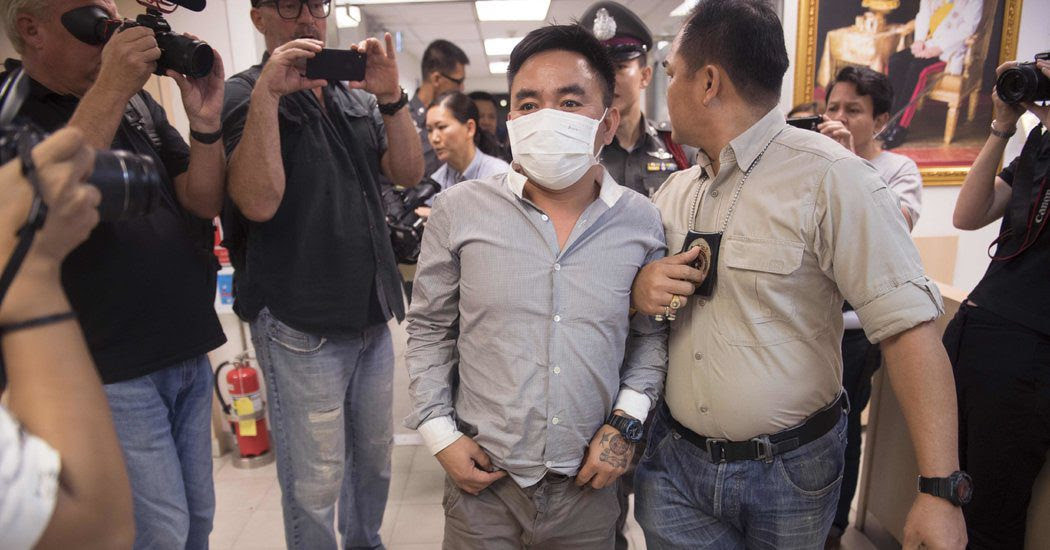

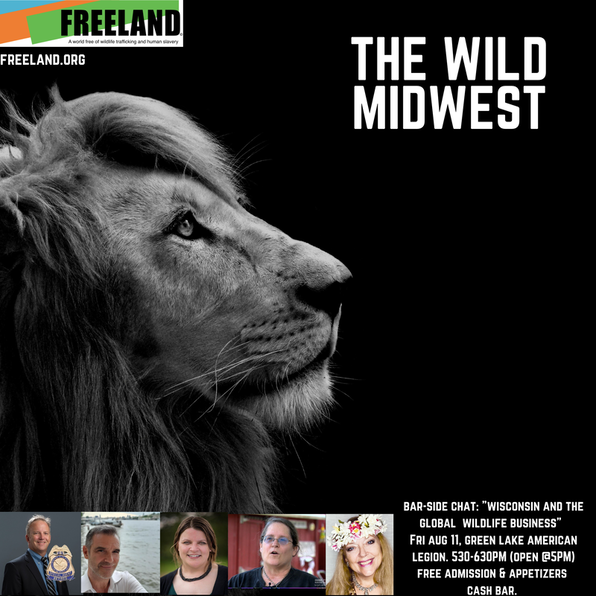
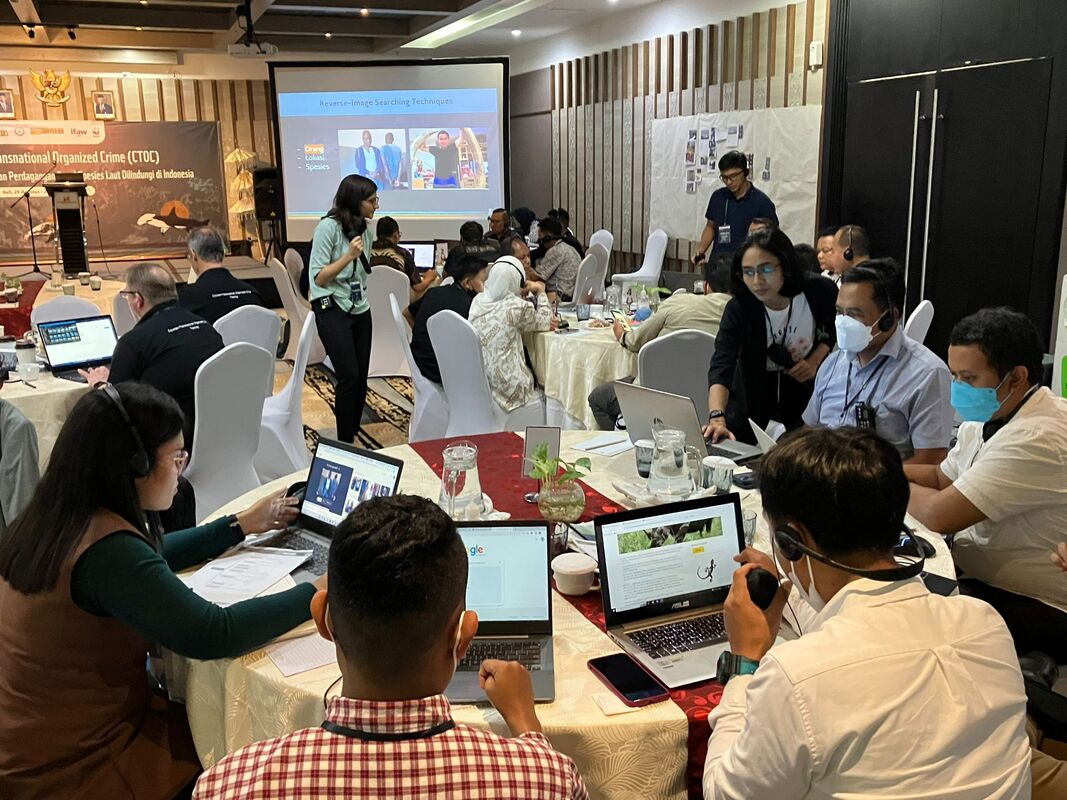
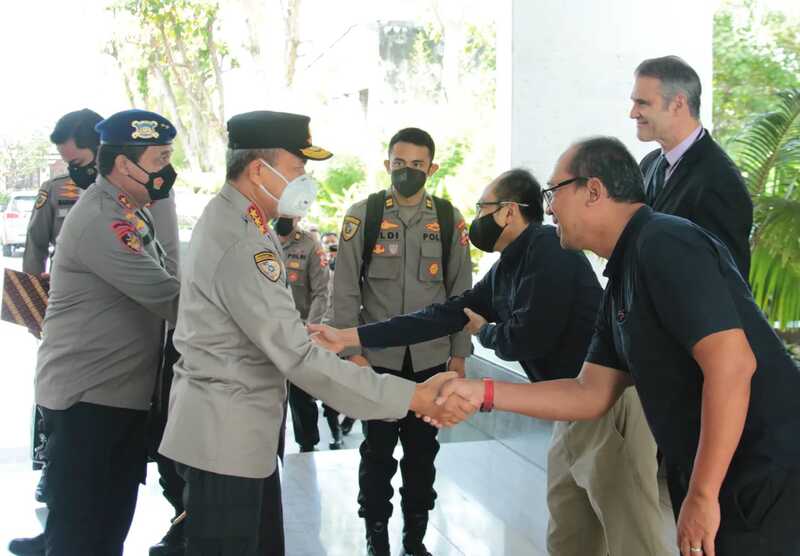
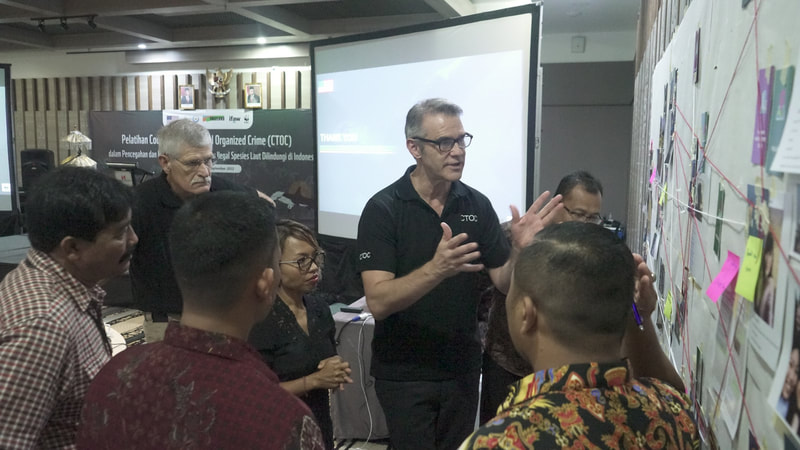
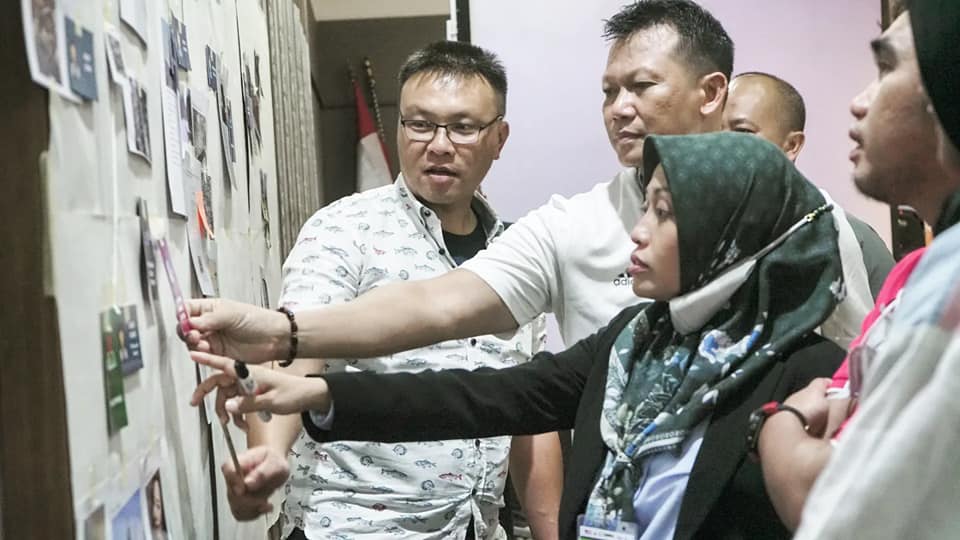
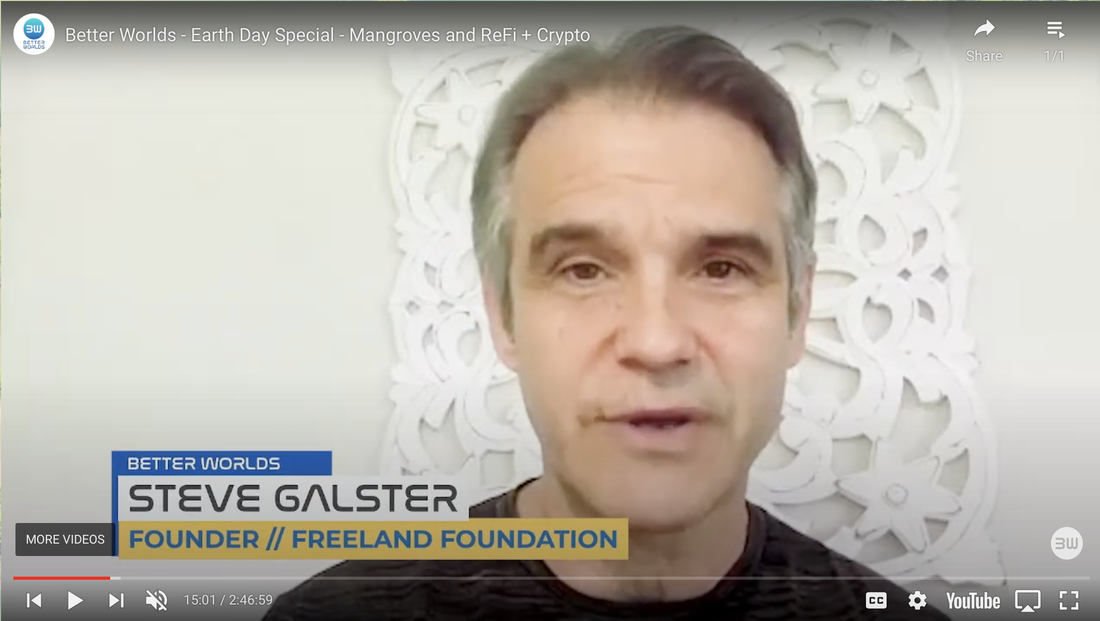
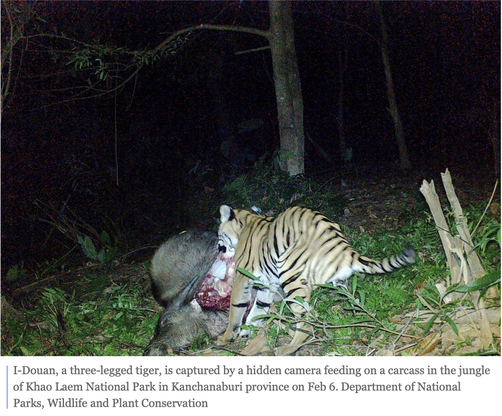
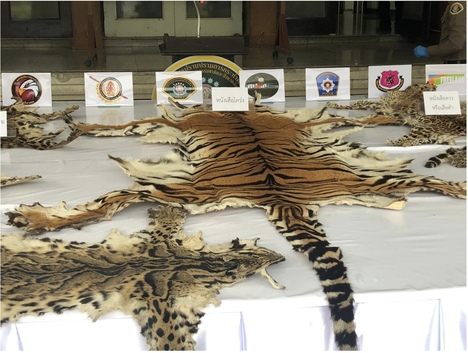
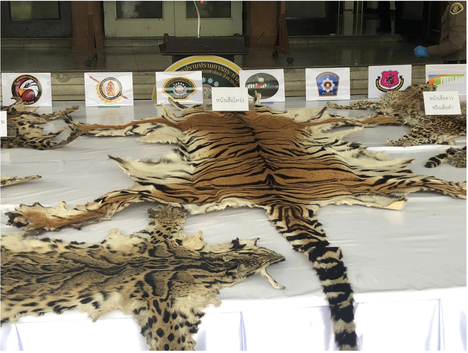
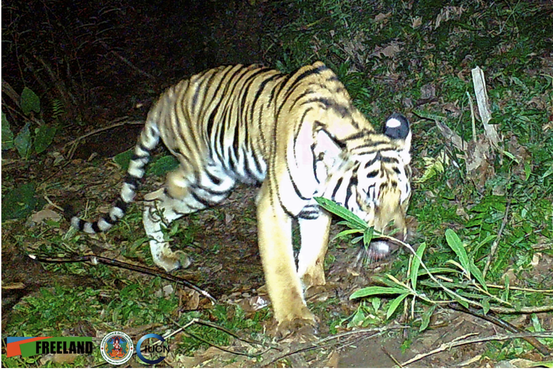
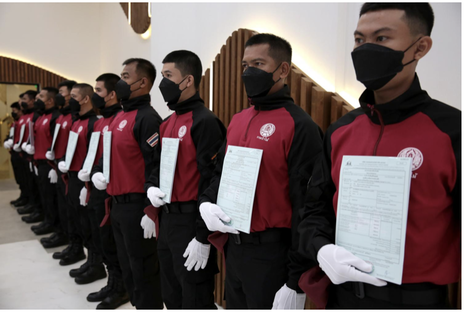
 RSS Feed
RSS Feed